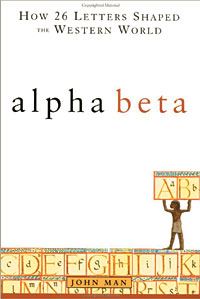John Man is a historian. His book, Alpha Beta, sheds light on the history of alphabets and their role in shaping modern civilization. Books about the history of languages are usually not very interesting. They are even sometimes dry. John Man’s wonderful style, knowledge and grip of classical literature and ancient history have, however, made the history of the evolution of alphabets an interesting one. It’s like traveling in time and space with some glimpses of early civilizations, like the faint light and glow of early galaxies.
This book is a good survey of the history of the art of writing. John Man talks about an alphabet’s symphony, rhythm and music. As a good storyteller, he narrates tales of the pharaohs and their scribes, how they were able to keep track of their stores, livestock and other resources, how they spread their writ to the far-flung regions of their empires and how alphabets helped them in crushing rebellions and in making borders safe. This book shows the importance of alphabets and how they become sacred to some ancient civilizations, how people were spellbound by sounds and images and how pictorial writing slowly yielded to the letters of modern alphabets.
Some scribes, following their own whims, invented their own styles. Alphabets in geometrical styles bore not only music but also worlds of meaning. In this book we learn of the role of priests who chanted hymns and scribes who wrote the detail of social and governmental affairs. The power and magic of alphabets and the written word is clearly shown. The evolution of alphabets contains the story of Holy Scripture and how they were memorized, collected and written. All people, it seems — white, black, brown and yellow — have danced, and are dancing, to the tune of alphabets. Between the lines their battle cries, poetry and flame-voiced songs can be heard.
This book provides a beautiful record of the ancient scripts found in the Middle East, Asia, Europe and America. It shows the brilliance, genius, labor and efforts of our ancestors who, with strong determination, left vast literary treasures in different languages. Their only vehicle was the alphabet which has, as we know, transcended time.
In the chapter, Limits to Growth, the author clearly shows that he is interested not only in the history and role of alphabets in ancient times but that he is also keen on evaluating its role in today’s high-tech society, “There is one fast-evolving culture still working out its own answers to the use of script: the Internet. Like it or not, computers and Internet are Western inventions. The technology is Western-based, the terminology is Western and the keyboards are mostly in an alphabet that would be familiar to a Roman 2,400 years ago.” Finally readers must decide whether John Man believes in the supremacy of Roman alphabets or if there is something else. To find this out, one must read the book.


